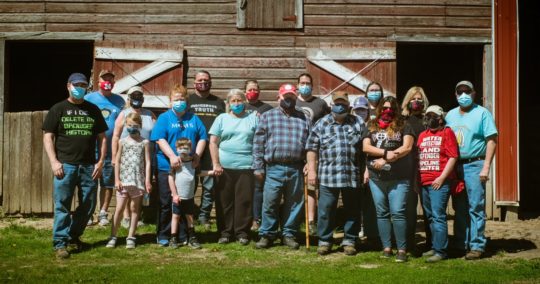A diverse contingent returned to Nebraska yesterday after lobbying their Congressional delegation, the EPA and the State Department to protect the Ogallala Aquifer. At each meeting, the group asked for the Keystone XL pipeline to have a supplemental environmental impact statement (EIS) and for consideration of an alternate pipeline route that avoids the Nebraska Sandhills. The State Department will ultimately decide if the project receives a presidential permit or not.
The group consisted of representatives from the Nebraska Sierra Club, Nebraska Wildlife Federation, Bold Nebraska, the Nebraska League of Conservation Voters, Nebraska Farmers Union and local landowners. Affected landowners from Texas and South Dakota joined the Nebraska contingency to lobby the EPA and State Department. Ken Winston of the Nebraska Sierra Club noted, “Any time you have people from Texas and Nebraska on the same side of an issue, you know it’s significant.”
The Nebraska delegation met with Sen. Ben Nelson and staffers who work for Sen. Johanns, Rep. Smith, Rep. Fortenberry and Rep. Terry throughout the day. The group also spoke with workers at the Environmental Protection Agency, asking them to continue pushing the State Dept. for a supplemental EIS. The delegation finished their long day in DC by directly asking the State Dept. to require a supplemental EIS and to consider alternate pipeline routes around the delicate Sandhills ecosystem and Ogallala Aquifer.
This was the first DC trip for landowner Susan Luebbe from Bassett. Luebbe says she went to DC to “give a voice for the people back home, for all the harassment from the Keystone land agents.” Luebbe’s son is headed to Afghanistan. She expressed the frustration of having her son go overseas and fight to defend his country while their land and livelihood are threatened by a foreign corporation.
Lynda Buoy is the president of the Rock/Holt County Farmers Union. She says, “I made the trip to DC to represent my friends and neighbors all along the pipeline route who are calving hundreds of cows right now. For the man who is calving 400 head of cattle on his own and has received condemnation letters from TransCanada. For the three little 90-year-old ladies that told me last summer they will never sign their leases.”
Cindy Myers of Stuart does not have land in the path of the pipeline. It will run two miles away from her home on her neighbors’ property. Cindy’s message to the federal government was to protect the Ogallala Aquifer. “The Keystone XL pipeline will actually be submerged in those waters of the aquifer, completely surrounded. And those waters are connected down to the water I drink.” Her ultimate concern is what a spill could mean to her drinking water. “A half inch of steel isn’t very comforting to me when it’s separating the most toxic crude oil in the world from the water that I drink.”
Randy Thompson is from Martell and is most concerned about the risks the Keystone XL poses to the Ogallala Aquifer. “If this pipeline is absolutely necessary, why can’t we run it somewhere safer? The aquifer is our state’s most precious resource. It’s preposterous to risk it for oil that might very well go to China.”
Malinda Frevert of Bold Nebraska asked the State Dept. to use the old adage “Measure twice, cut once,” in their consideration of the need for a Supplemental Environmental Impact Statement. “Protecting our water is vitally important to Nebraska and the nation. We need to do everything we can to make sure it is done right.”
Pictures
(can be used for free, with attribution to Mitch Paine): http://tinyurl.com/NEDCpics
Videos:
Cindy Myers (with permission of National Wildlife): http://tinyurl.com/CinMyers
Lynda Buoy (with permission of Bold Nebraska): http://tinyurl.com/LynBuoy
Susan Luebbe (with permission of Bold Nebraska): http://tinyurl.com/SusLuebbe
More Info on Pipeline:
UNL Dept. Ag Economics paper on the pipeline: http://tinyurl.com/unlpipeline
Bold Nebraska resource page: http://www.boldnebraska.org/pipeline-background-resources
NWF report on pipeline: http://tinyurl.com/nwfreport
Sierra Club profile of individuals affected by pipeline: http://tinyurl.com/sierrareport
Joint report on pipeline safety: http://tinyurl.com/pipelinesafety
Contacts:
Ken Winston, 402-212-3737, kwinston@inebraska.com
Jane Kleeb, 402-705-3622, jane@boldnebraska.org





